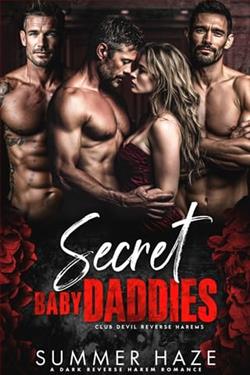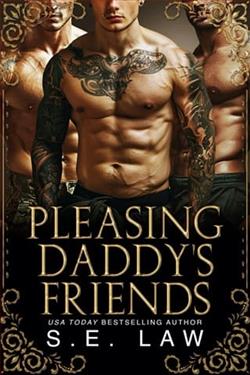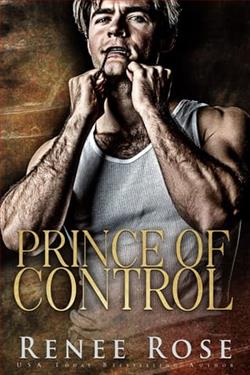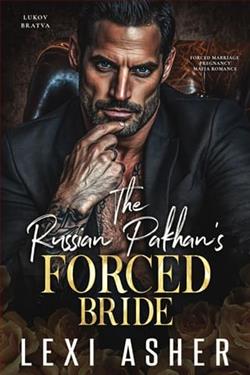Page 33 of The Guardians of Dreamdark
Magpie took a deep breath and walked toward the door.
In his sleep, the Magruwen sensed their coming. He smelled feathers, and an image of vultures came into his mind, planted there by the imp’s riddle. He recalled the distant day his brother Djinn had made them. Some creatures had been made as art; others were pure utility. Vultures had been shaped in haste to clean a field of slaughter when a powerful elemental had first begun to toy with death in the new-made world. The notion of murder had been born that day, and the Djinn had fashioned vultures to spare themselves the sight of it. They’d made them out of shame and had done well to make them; vultures had never fallen out of use since.
But there was no scuff of death on these feathers that beat heavily down the well shaft; they smelled of rain and fires. And there was another scent: faerie.
The Magruwen came awake. His sleep had been troubled, and he had not sunk far. Flames took the shape of a horned beast rising to its feet. The scent of faerie, pure as dew, was bitter to him. His flame hands clenched with the memory of betrayal, and he waited.
Magpie leaned on the door with all her might to push it open a crack. It creaked, and a trickle of smoke began to seep out. Magpie pushed harder, cradling the cake to her chest, and stepped into the Magruwen’s cave, heart pounding. “My lord Magruwen...?” she asked tentatively. The lake of smoke before her moved with a sluggish tide, and the scuttle of salamanders up and down the stalactites sounded like a chorus of otherworldly whispers. The source of light seemed to be in the deep reaches of the cave where the ceiling sloped down like rows of teeth in a giant jaw.
“First an imp and now a faerie” came a harsh whisper, sending ripples through the smoke and chills down Magpie’s spine. “Get you gone. I don’t deal in treasure anymore.”
“My lord? I...I’ve come for wisdom, not treasure,” she said, her eyes searching wildly for her first glimpse of the Djinn.
“Wisdom? For whom?”
“For all my kind. We need your help.”
“You are past helping...,” the whisper said, growing louder. Magpie watched breathlessly as the glow from the deep of thecave moved closer, flickering in the rough form of legs striding. “Past deserving,” the voice continued. “Faeries have become a second race of butterflies, mere ornaments for the air.”
The Djinn grew brighter, and Magpie had to cast down her eyes, feeling his heat pulsing at her in waves as he drew nearer. Her mind raced. The Djinn wore skins, didn’t they? In the stories they appeared clad in wondrous forms. She had expected some majestic ancient, crowned perhaps, with a beard of fire and sparks for eyes, sitting in state on a hematite throne. Not this wild open flame. She tried to look at him, but he was so white-bright she had to snap her eyes closed. Behind her shut lids an afterimage burned of a beast with curved horns of flame. She began to back blindly away.
“We are more than butterflies, Lord,” she whispered.
“Aye, you are right. You are more treacherous. More false.”
“Neh!” Magpie said. “Not that! Careless maybe, not treacherous. Faeries aren’t traitors.”
“You think you know. Faeries! You are your own undoing. Old treachery comes back to haunt you, but even now you won’t learn, even when the last of you flickers out.”
“What old treachery?” Magpie cried. “What do you mean, flicker out?”
“Don’t you like surprises?” he asked. He rushed up close then, and Magpie stumbled backward against the door, feeling the intense weight of heat upon her face and smelling scorched hair. For an instant, she could find no air to breathe and sank to the floor, realizing for the first time with what simplicity the end could come.
Then, just as suddenly, the Magruwen drew away.
“What is that?” he asked in a quick sharp hiss.
Magpie remembered the cake. “My lord,” she gasped, holding it out. “An offering. Your favorite...I hope.”
“That recipe has long been gone from this world!” But even as he said it, the Magruwen’s voice faltered. Into his sulfurous cavern this small faerie had carried the scent of honey, tears, and lightning, of thirsty roots in future soil, of wind through wings, a fragrance long absent, but well remembered.
“I found it,” Magpie said in a small voice. “I hope I made it okay.” She continued to hold it out to him, her arms shaking. After a moment she felt the heavy heat again, and the weight of the cake was lifted from her arms. The twigs of the starling’s nest crackled like kindling, and she waited.
The sound he made was something like a sigh. A little of the tension that held Magpie rigid eased from her limbs and she rose again to her feet. “My lord...is it...all right?”
“Imperfect,” he said, spitting. The acorn shot from his mouth and pinged into the smoke, setting off a loud cascade of hidden treasures, and Magpie tensed, ready to spring aside should he come at her again. “There’s no thousand years in that nut,” the Magruwen said, flaring high. Then he diminished, thinned, and said quietly, “But it was not...badly done.”
Relief flooded Magpie, and she found she could look at him now, if she squinted. He had made himself into a spindle of flame that still bore within it the impression of a figure rising to taper into tremendous curving horns. And there were eyes. Once Magpie found them, she felt locked onto them andcouldn’t look away. They were vertical, windows through fire into the infinite. They were dizzying.
“Why have you woken me?” he asked, and Magpie blinked and was able to break her gaze from his.
“T-there’s...” she stammered. “There’s a devil, escaped from its bottle. A devil you saw fit once, yourself, to imprison.”
“And how do you know this?”
“I found the bottle and your seal. I never knew you snared any devils yourself, so it...it flummoxed me.”
“There is but one bottle that bears my seal.”















